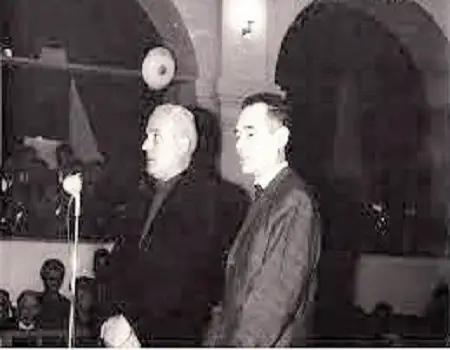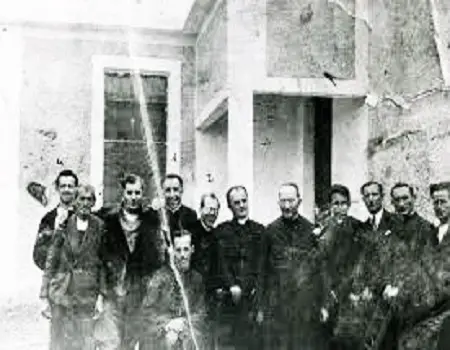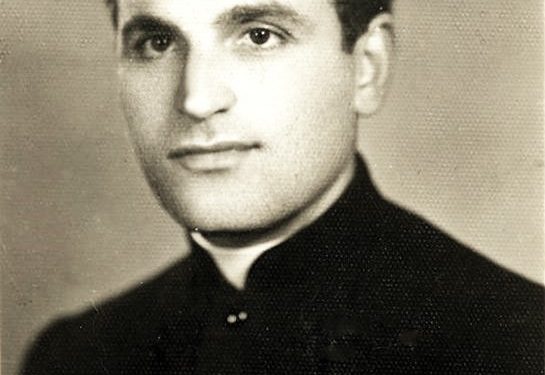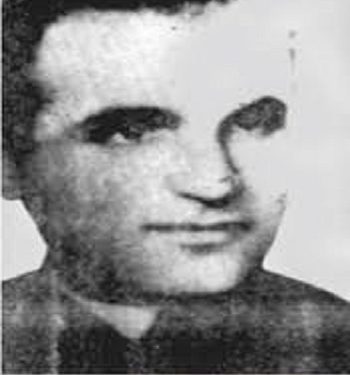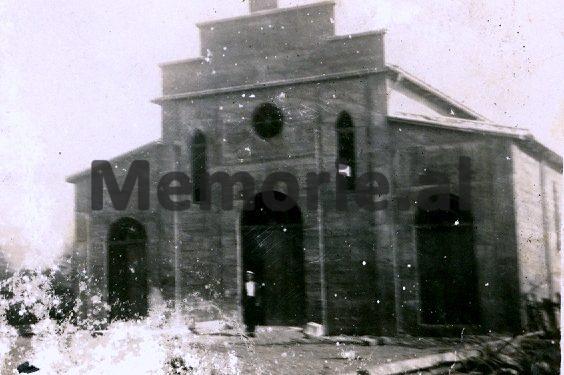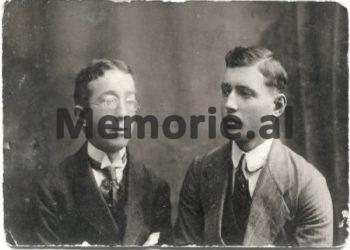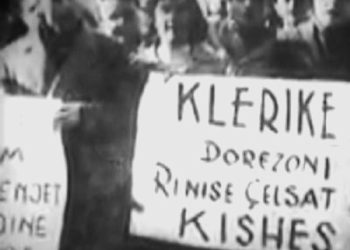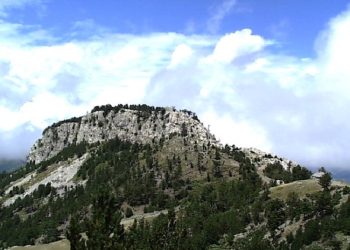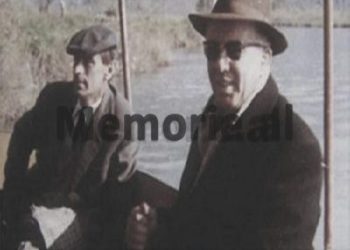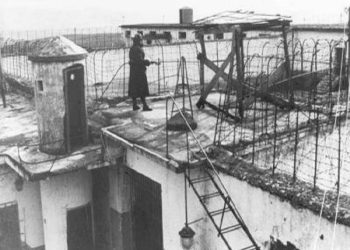By Dr. Peter Pepa
Memorie.al / We remember the anniversary of the shooting of two Catholic priests: Dom Zef Bicit and Dom Mark Dushi. Like today, at midnight on May 2, 1968, (some others say May 10, 1968), in a deserted field in the village of Dobrac, in the outskirts of Shkodra, where machine gun batteries were firing. Two pastors of the Catholic Church of Albania, two priests known by the whole community for their priestly, evangelical and patriotic zeal, fell from their bullets, in the pit they were forced to open themselves.
As Father Zef Pllumi writes in his book, Dom Zef Bici, was executed on May 10, 1968. The remains of the cleric, together with those of Dom Mark Dushi, his friend since his youth when they served as parish assistants in Tirana and, until the time when they heard the decision of the sentence by firing squad, they were found 25 years later, on September 12, 1993, in a field in Dobraç.
In April 1968, the judicial process was held for four consecutive days in the Church of the Sigmatine Sisters, in the city of Shkodra, which at that time had been turned into a Youth Club, under the charge of five Catholic clergy; Father Gegë Luma, Dom Frano Ilia, Dom Mark Dushi, Dom Zef Bici, Dom Mark Hasi and two believers; Alfons Radovani and Col. Marlacaj, who were taken as defendants, “for hostile activity and agitation and propaganda against the popular government”.
The trial against them, which took place with great fanfare (a public unmasking trial with open doors and loudspeakers) “in the framework of the war against religious beliefs and backward customs”, which the communist regime of Enver Hoxha had undertaken since 1966, (the time when the demolition of cult objects, such as churches, mosques, monasteries, religious buildings, monasteries, etc.)
Dom Zef Bici and Dom Mark Dushi, these two priests, were shot after a farcical trial, with the accusation: “enemies of the people”; “Vatican spies”. Only one year had passed since the infamous 1967, when the communist dictatorship closed the doors of religious institutions and temples, convinced that it had succeeded in defeating and eradicating God from the Albanian lands and faith from the Albanian believers. Time revealed the truth.
Thus began the new wave of shootings of the last clerics who had escaped from the previous waves. The two mentioned priests, along with some regulars, were arrested shortly after the closure of the Churches and were brought before the self-styled “people’s” trial, which took place in the Church of the Stigmatine Nuns in Shkodër, turned into a Youth Club.
The District Court of Shkodra, presided over by Nuri Resmja, gave the decision, dated April 25, 1968, sentencing to death, by firing squad, Dom Zef Bicin and Dom Mark Dushin, on the charge of: “High treason against the motherland” and “agents of the Vatican”, while with 25 years in prison, Dom Frano Ilian, Dom Mark Hasin, Father Gegë Lumën, etc.
The trial ended with several death sentences and heavy prison terms. It mattered little, if the priests proved their innocence before the court, that there was no real evidence against them, that the religious and patriotic activity they had performed, deserved reward, not shooting. The decision for their life and death was made before the trial began, with puppet judges, with convicts who represented what was good and great for the massacred Albanian people.
Martyrs of the Cultural Revolution led by Ramiz Alija
May 10, 1968 – Dom Zef Bici and Dom Mark Dushi are shot; with severe imprisonment; Dom Frano Ilia and Dom Mark Hasi, Pater Gegë Luma, etc. Dom Zef Bici was born in Gurëz village of Breg i Mata, on May 19, 1919, to his parents; Dede Ujk Bici and Dile Precja. He was baptized in the village of Gurëz, in the Church of Saint Michael by Dom Ndue Lleshi, on June 22, 1919. He attended primary school in the village of Gurëz, in the years 1927-1932. In 1934, he entered the Pontifical Seminary, where he studied Theology for four years.
In 1939, with the death of Imz. Pjetër Gjurës – Archbishop of Durrës and the administration of the Archdiocese, Monsignor Gaspër Thaçi, due to health reasons, temporarily leaves the Seminary and joins Monsignor Thaçi. In the Archdiocese of Shkodra, Monsignor Vinçenc Prennushi, Archbishop of Durrës, was elected. So he stood next to Monsignor Thaçi, always being a seminarian of the Archdiocese of Durrës, who held a seminarian from Shkodra, in his place.
In 1944, he took part in the drama “Castle of Alcaxari”, a part that exposed communist crimes in Spain, staged by Dom Pjetër Gruda, at that time he had not yet become a priest. On February 2, 1946, he was ordained a priest in the Cathedral of Shkodra, by Monsignor Gaspër Thaçi, and the next day, he said his first Mass there, always with his godfather, Monsignor Thaçi.
On April 21, 1946, he said his first Mass in Tirana and the next day in Durrës. On April 26, 1946, he said his first Mass in Gurëz and after two days, on April 28, in his hometown, Bregun e Mata. On May 10, 1946, he is in Durrës, near Dom Anton Zogaj, as an assistant parish priest, although he still has no appointment decree, only sent verbally, by Monsignor Prennushi. On November 6, 1946, he is in Tirana, even here without a decree of appointment, only by verbal transfer, from Monsignor Prennushi, where he serves as parish assistant until 1952, together with Dom Mark Dushin. In March 1952, he went to Shkodër, near the Presidency of the Catholic Church, being appointed as head of administration, head of personnel and head of culture.
During this period, he is also Rector of the Church of Russia, Rector of the Church of Our Lady, Rector of the Church of St. Joseph and Deputy Parish Priest of Shiroka. Meanwhile, he almost leads the meetings and efforts for the acceptance of the Statute by the communist government. In 1955, he was dismissed from his duties at the Presidency of the Church and since January 1, 1956, he is available, serving for a short time, as parish assistant in Shiroka. It was proposed to him to stay in the Archdiocese of Shkodra, but he did not accept and was placed at the disposal of the Ordinary of the Archdiocese, Dom Luigj Gashitv – Vicar Cap of the Archdiocese, who proposes to go to Durrës, or Zheja.
Agrees to go to Zheja, in 1956, saying the first mass there, on March 25, 1956, presenting Dom Frano Ilia, Secretary of Kruja, to the people. With the proposal of the Ordinary, Dom Luigj Gashi returns to Tirana again, replacing Dom Mark Dushin, who had asked to leave Tirana. On April 28, 1957, he became parish priest of Tirana, taking over from Dom Mark Dushi, who was parish priest in Zhejë-Mamurras. He is also an administrator for the parishes of Vlora and Elbasan.
On 12.9.1957, the Vicar Chapter of the Archdiocese of Durrës was elected by the Diocesan councilors, upon the death of Dom Luigj Gashi. With the letter N.1 /12 dt. 18.11.1957, it is announced approved by the Presidency of the Church and the Council of Ministers, according to the Decree-Law, on Religious Communities, Article 13, that with his appointment as Vicar, the administration of the Parish of Vlora is handed over to Dom Mark Dushit.
He stayed in the Parish of Tirana until November 1964, when he was arrested and sentenced for not reporting the crime, being replaced by Dom Ndoc Sahatçija. He was released after a year, but without the right to stay in Tirana, and was appointed to the Diocese of Lezha, as Parish Priest of Mercije and Rraboshta, where he stayed until March 1967. After this date, he passed by his family, to fall victim of the Cultural Revolution, when he was arrested on July 4, 1967.
Tried in the Church of the Stigmatine Sisters – Shkodër, returned to Klub-Rinije and sentenced to death by firing squad on April 25, 1968, for high treason against the country; and agent of the Vatican.
He was shot on 10 (2) May 1968. His remains, as well as those of Dom Mark Dushi, were found 25 years later, in a field in Dobrac, on 12.9.1993, and returned to a memorial plaque, near the Church of the Heart of Christ of Tirana. He is decorated as a “Martyr of Democracy”, along with Dom Mark Dushin, as well as Dom Shtjefen Kurti, whose remains have not yet been found…!
Dom Mark Dushi was born in Gjakovë, Dukagjin Plain, on November 19, 1920, to parents Pjeter and Tereze Balto Geci, from Skopje. He is baptized in Gjakova, in the Church of the Apostles; Pjetër e Pal, from Patër Marjan Glasinović and at the age of six months, leaves with his family and comes to Shkodër, where he completes the first grade at the Franciscan Shkodër School and, after a year, continues in Tirana at the “Naim Frashëri” dormitory in 1929. In 1934, sent by Monsignor Pjetër Gjura, he is a boarder at the “Heart of Christ” Orphanage, not having a place in the Seminary.
Completed the first year together with the students of the Pontifical Seminary and Xaverian College. In 1935, he was a student at the Albanian Pontifical Seminary with the Archdiocese of Durrës. In the period 1935-1942, he completed three years of Philosophy in Shkoder and four years of Theology. Takes part in the 1944 anti-communist Spanish anti-war drama The Castle of Alcaxar.
He was ordained a priest by Monsignor Vinçenc Prennushi, Archbishop of Durrës, in the Parish Church of Tirana, on February 2, 1946, and there, he said the first Mass, with you as godfather, in the absence of Father Pjetër Palladini, who in those days, repatriated, Father Peter Meshkalla, Rector of the Church of the Heart of Christ and Director of “Catholic Action” in Tirana. Since 1945, Besimi has been a teacher in 16 elementary schools in Tirana, until the middle of 1946. He is appointed cooperator in the Parish of Tirana, with the Parish Priest, Dom Shtjefën Kurti.
On October 30, 1946, after the arrest of Dom Shtjefën Kurti, he is Vicar General of the Archdiocese of Durrës and Parish Priest of Tirana, verbally appointed by Monsignor Prennushi. He remained in this position until 1950, when he was appointed Dom Pjetër Dema, then Parish Priest of Milot, Vicar and Chapter of the Archdiocese of Durrës. During the years 1946-1954, he served in the Parish Church, but also in that of the Heart of Christ, as its Rector. He is the Chaplain of two state hospitals, Civil and Military, in Tirana, in the years 1946-1947, as well as the confessor of the Ancelle Sisters of these hospitals.
In 1950, he participates in a Peace Conference, held in Tirana, with other representatives of religious faiths, writers and artists, etc., against atomic weapons and, in favor of peace, and for his speech, he is thanked and congratulated by Frederic – Joliot; Curi, President of the Peace Partisans Congress Committee. On October 13, 1950, he is a member of the Commission for the compilation of the Statute and Regulations of the Catholic Church of Albania and the mediator of the Church’s Headship, in relations with the State.
It has collected historical data for the Parishes of Tirana, Durres, Vlora, Elbasan, Preveza, Janina, Zheja, Bushnesh, Delbënishti, etc., as well as one; Status animarum; of the Parish of Tirana. During the years 1946-1954, he was the Administrator of the United Catholic Church, in Elbasan, as well as the Administrator of the Vlora Parish Church, for the period 1946-1966. On December 13, 1952, he became a Diocesan Councilor, which he held until February 12, 1967. On November 14, 1961, he was appointed Deputy Parish Priest of Delbënishti, while on October 12, 1966, he moved to the new Parish of Gurëzi.
With the closure of the religious institutions, he returns to his family. He was arrested on September 23, 1967, after the “Programmatic Speech” of the dictator Enver Hoxha, which was to start the campaign of closing churches and destroying the objects of religious cults. It is accused that; when he went to Vlona, they said mass, he gathered military information about Pashaliman, Gryka e Koçi, Sazani, etc.
He is in his group, with Dom Zef Bicin, Dom Mark Hasin, Dom Frano Illine and others, in the public trial that takes place in the church of the ‘Stigmatic Sisters’ in Shkodër, back in the Youth Club. On April 25, 1968, he was sentenced to death – shooting, for; high treason against the country; and agent of the Vatican. He was shot on May 10 (2?) 1968. Memorie.al




